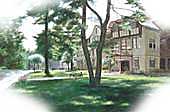Spring
1995
The Power of Weakness
Richard M. Riss
In the Christian faith, nothing is more powerful than weakness.
It provides the background for the release of all the power
of God. Every advance that is made in the Kingdom of God derives
its efficacy from weakness.
Christianity is full of apparent contradictions. Those who
are first will be last, and the last first. We live by dying,
we gain by losing. Likewise, we derive our power from weakness.
This is fully evident in the life of Jesus. When betrayed
by Judas and arrested, He did not call down fire from heaven
or ask for legions of angels. Rather, He allowed them take
Him away because He understood the power of weakness.
Jesus could afford to be kind. He healed the ear of one of
his captors after His disciple had cut it off. Though He was
innocent, He did not attempt to answer His accusers. When
he was scourged, whipped, and crucified, He did not complain.
Jesus did not tell the perpetrators of these injustices that
He was innocent or that He was being treated unfairly. This
was because there is no spiritual force greater than weakness,
particularly when it is accepted voluntarily with the knowledge
that God is sovereign and will rectify all wrongs.
God shows Himself strong on behalf of those who do not take
upon themselves the responsibility of their own defense. Because
He is our defender, we can afford to treat our enemies kindly.
We have absolutely nothing to fear from anything or anyone,
because we know that the One who defends us is capable and
all-powerful.
David understood this truth in his struggles with Saul. On
several occasions he could have killed Saul. But David knew
he could afford to allow his enemy to live. He understood
that the Lord was his vindicator and defender and that in
His time and way, God would take care of his enemies. This
principle is the theme of many of the Psalms that were written
during the heat of the conflict between Saul and David.
This is the reason Jesus told us to love our enemies. There
is tremendous power in this principle; so much so that Paul
in his Epistles likens it to heaping burning coals upon a
person's head. The way to utterly defeat an enemy is to treat
him with absolute kindness rather than with malice. What can
be more disconcerting or disarming to any enemy?
Throughout the ages, it has often been said that "the
blood of the Martyrs is the seed of the Church." This
comment, which originated with Tertullian in the late second
century is simply an observation of the truth of the principle
of the tremendous spiritual power of weakness. Nothing has
greater power than those who, making no attempt to defend
themselves, are martyred for their faith in Christ. This becomes
an inspiration to others to disregard the possible consequences
and become Christians.
There is a powerful illustration of this principle concerning
Stephen in the book of Acts. Stephen, when stoned for His
faith in Christ, did not put up a fight. Contrary to all of
the expectations of those who opposed him, he asked that God
forgive them. Because Stephen did this when he was stoned,
eventually, Saul of Tarsus who was present, became Paul, one
of the greatest apostles known to the Christian faith. It
is probable that he was greatly affected by the spiritual
power that was released through Stephen's forgiveness of those
who stoned him.
Weakness is among the most powerful weapons of our spiritual
warfare. As we have just seen, forgiveness is one of them.
Another is humility, also a form of weakness. If we humble
ourselves in the sight of the Lord, then, we are told, He
will raise us up in due time. This is an infallible principle
for those who engage it with the proper motivations.
If you desire to become a strong Christian warrior, become
weak. Forgive your enemies and humble yourself. Let others
have the preeminence. Do not maneuver your way into an enviable
position, but wait for the Lord. Then when the Lord moves
in your behalf, it will be clear that it is the Lord who raised
you up, and that you could not possibly have done so yourself.
To fight the good fight effectively, we must not boast or
attempt to make ourselves look good. We must, in modesty,
remain silent unless there is a clear mandate from God for
us to speak. If we are weak, then the Lord is released to
show Himself to be strong in our behalf.
Weakness is closely related to an absolute reliance upon
God for everything. Such reliance does not constitute passivity,
but trust in the power of God, and recognition that in and
of ourselves, we are as nothing, but if we are living and
working in obedience to God, He will bring to pass all that
concerns us.
Let us pray then, that the Lord will enable us to become
vessels of weakness. Let our desire be that we act according
to these principles, and that we be given the grace to love
our enemies, to humble ourselves, and to seek only to please
Him who created us, and desires the best for us.


